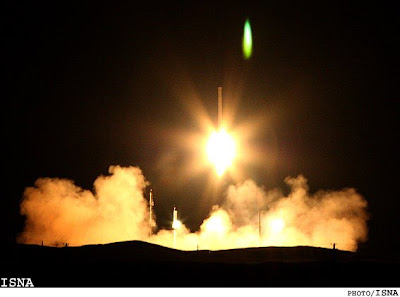[T]he Iranian technological success worries American and other countries national security experts because it places Iran much closer to being able to deliver a nuclear warhead against an enemy.
But there is another reason American military and national security officials are so worried: in at least two earlier ballistic missile launches, the Iranians launched in ways that “appear they were designed to optimize an EMP burst,” according to a Pentagon source with detailed knowledge of the Iranian’s efforts and of space technology.
EMP stands for electro-magnetic pulse and it is one byproduct of a nuclear blast. EMP destroys power sources, communication capabilities and would cripple or destroy the abilities of most satellites to function. A percentage of military communication and other satellites are hardened against EMP but the gravest effect would be on the ground, the space expert said. “As bad as the space part of this is, that is pretty bad, but the ground part of it is much, much worse. Effectively, whoever was subjected to an EMP burst would be shoved back to an agricultural state.” Few civilian assets such as power grids, generators, telephone systems and commercial communications satellites are hardened against EMP.
This is part of the reason why the State Department has expressed “great concern” about the development. Pentagon spokesman Geoff Morrell said the satellite launch appeared to indicate Iran was working on a ballistic missile capable of “increasingly long range.” Combine a long-range ICBM with a nuclear payload and you get a new member of an even smaller club, the countries such as the U.S., Russia, China, France and Britain who can play the deadly serious global strategic game of hitting places around the globe with nuclear weapons.
Iran’s success elicited grudging admiration from the space expert. “They have had more success than a lot of other aspirants. Their path has been fairly linear and fairly successful,” this source said. All this occurred, of course, in the face of international sanctions against Iran, which included specific UN prohibitions against work on ballistic missiles.
Another reason for concern about the Iranian accomplishment, the space expert said, is that lofting a satellite into a successful orbit is, in some respects, more technologically challenging than building an ICBM. So Iran would appear to be extremely close to having the ability to send aloft a small nuclear device. And, this expert said, a trigger for a small, unsophisticated nuclear device is relatively easy to design and make if you are not trying to be highly accurate.

